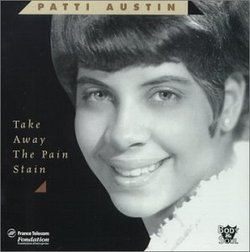22 pure soul gems by a fifteen-year old Patti
08/09/1999
(5 out of 5 stars)
"The record releases all the sides Patti's done for Coral Records between 1965-67, with two tracks previously unissued, and none of them ever available on CD. They are a pure joy in the best Motown or Stax class, and already reveal a lot of what was going to come. It is clear that they were trying to push her into directions that were en vogue at the time but her unique artistry, her drive and her sense of humor are obvious.The re-release is very carefully produced by a new French record company and contains a 12-page booklet with beautiful memorabilia reproductions, informative liner notes and a discography.I recommend it."
Patti Austin: Teenage Singing Star
James A. Allio | Oakland, CA USA | 11/08/2000
(3 out of 5 stars)
"Patti Austin was born into a musical family: her father, Gordon Austin, played trombone in several major orchestras, Dinah Washington was her godmother and Quincy Jones her godfather, and she demonstrated precocious singing talent, debuting onstage with Washington at the age of four and cutting her first single at six. By her early teens, Jones had enlisted her to sing back-up for his teen singing discovery, Lesley Gore, and Coral Records signed Patti and began issuing singles by her. This CD gathers all the extant material cut for Coral, and it is a delight for Patti Austin historians and fans of mid-60s girl group and Motown sounds. Austin is only occasionally recognizable as the quintessential Quiet Storm balladeer on these 22 enjoyable tracks; she sounds more like Martha Reeves than anything else. There are quite a few faux-Motown riffs here, like the funky "This Thing Called Love," the unintentionally hilarious title song, "Got to Check You Out" and "Only All the Time," which evidently burned up the dance floors in England's Northern Soul club scene. She covers her godmother ("What A Diff'rence A Day Makes") as well as essaying a florid version of "A Million to One" sung with earnest and youthful sincerity, turns in the original performance of Lulu's "Leave A Little Love" and, in "He's Good Enough for Me," perfect mid-60s teen girl pop. What emerges in these lightweight but thoroughly enchanting sides is a young singer who was already a vocalist of uncommon power and expressiveness, able to handle a wide range of emotions and moods, and giving hints of the sophisticated jazz/r&b star she is today."


 Track Listings (22) - Disc #1
Track Listings (22) - Disc #1